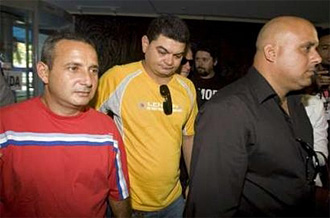 |
 |
 |
 News from Around the Americas | December 2007 News from Around the Americas | December 2007  
Six Cuban Musicians in Miami After Defecting
 The Miami Herald The Miami Herald
go to original


| | Cuban musicians Juan Alcides Diaz, Arodis Verdecia Pompa and Miguel Algel Costafreda (L-R) arrive at Federal Police headquarters in Recife, northeast Brazil, December 17, 2007. The three musicians, who went missing in Brazil last week, will ask for political asylum, Brazilian television reported on Monday. (Reuters/Eduardo Queiroga) |
Six of the seven members of the popular Cuban musical group Los Tres de la Habana arrived in Miami on Wednesday after crossing the Mexican border to ask for political asylum in the United States.

The group had been appearing in Cancun, Mexico, as part of a cultural exchange. On Dec. 17 the six decided to cross the border by way of Tijuana in Baja California and seek asylum.

"After we crossed the border we were in Los Angeles for several days to arrange future projects for the group," Germán Pinelli, the group's director, told El Nuevo Herald.

The group is made up of three singers and several musicians. A seventh member of the group, José Antonio Canals, decided to return to Cuba for personal reasons.
DeLand Mayor Seeks Visas for Circus Workers
Rosa Ramirez - news-journalonline
go to original

As debate over illegal immigration continues to polarize the U.S., a local politician recently asked the federal government to help a local company secure visas to bring skilled Mexican workers here legally.

The request for legal workers cites the same justification voiced by politicians, including the president, who favor creating a mechanism to legalize workers already here illegally: a lack of U.S. workers willing and able to perform certain jobs.

DeLand Mayor Bob Apgar wrote to the U.S. Department of Labor on behalf of Cole Bros. Circus Inc. this month, asking that the department approve visas for workers needed to set up the circus tent, seats and aerial riggings.

In recent years, the circus has needed more and more workers from outside the U.S. and now imports about 30 from Mexico through the H-2B visa program each year for the jobs, which last year paid about $8 an hour, said Renee Storey, vice president of administration for Cole Bros.

Under the H-2B program, the federal government allots 66,000 visas for nonagricultural seasonal employees for jobs left unfilled by American workers.

"There are not American citizen workers to fill these jobs," Storey said.

Circus officials say they need the mayor's support because Congress has not acted on a bill that would continue to allow companies to re-import previously approved workers without those workers counting against the 66,000-visa cap.

That exemption was originally approved in 2005 but expired Sept. 30.

Congress may be stalling on the bill because of the debate over illegal immigration, even though all workers would be entering the country legally with the visas, said Richard A.C. Alton, counsel for the American Immigration Services in Bunnell.

"Since the H-2B is (a) visa, it has been cast into the pot with the rest of the immigration-type discussions occurring on Capitol Hill," Alton said.

Industries that compete for the visas include tourism, food service, construction and commercial fishing, according to the U.S. Citizenship and Immigration Services Web site.

Groups pushing for increased immigration restrictions say all foreign workers, regardless of their legal status, suppress wages and take jobs away from U.S. workers.

"The increase of a pool of workers, from both legal and illegal immigrants, contributes to the stagnation of wages," said Bryan Griffith with the Center for Immigration Studies. Low-skilled U.S.-born laborers are most affected by the downward pressure on wages, he said.

But the type of work in the circus makes it increasingly difficult to recruit U.S. workers, as employees must travel with the circus for long periods of time, Storey said. Employees spend an average of three to four days in each location. Last year, the circus moved to 100 different locations over a nine-month period.

Apgar said some jobs just aren't easy to fill.

The circus is "not necessarily a life people enjoy, particularly when they're on the road," he said. "They set up the tents, have a show, hit the road and start the process all over again. . . ."

To help entice people to work for the circus, Cole Bros. provides roundtrip transportation to and from the U.S.

Getting H-2B visa foreign workers is a complicated three-step process, said David F. Vedder, an immigration lawyer in Daytona Beach.

Employers must apply for certification by the Department of Labor asserting the company can't find American workers for specific positions. Employers are required to publicly advertise the jobs before applying for the certification.

Employers then apply for the visas with U.S. Citizenship and Immigration Services and pay fees. Visa applicants are carefully screened and undergo background checks for previous criminal offenses, deportations or illegal entries.

rosa.ramirez(at)news-jrnl.com | 
 | |
 |



